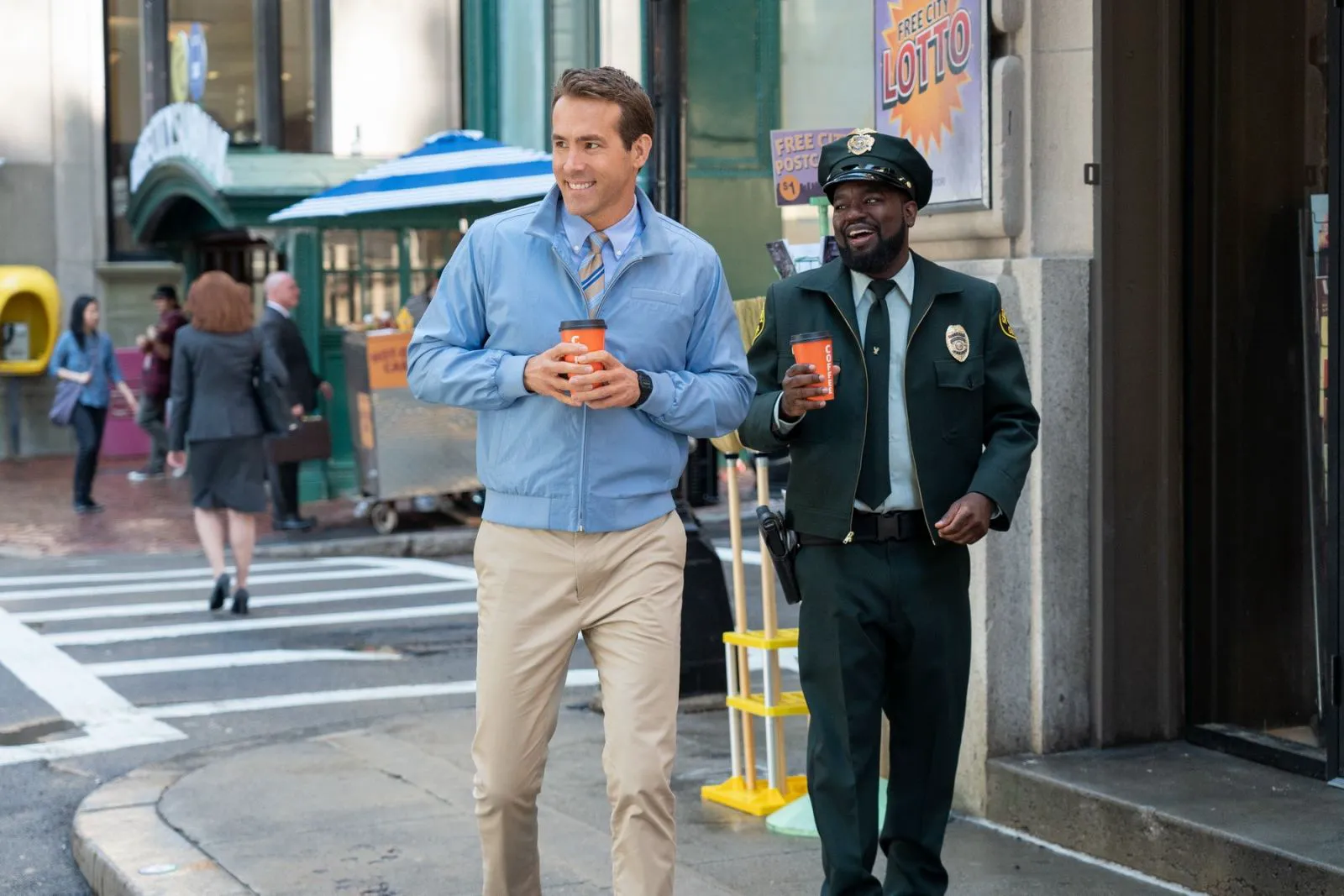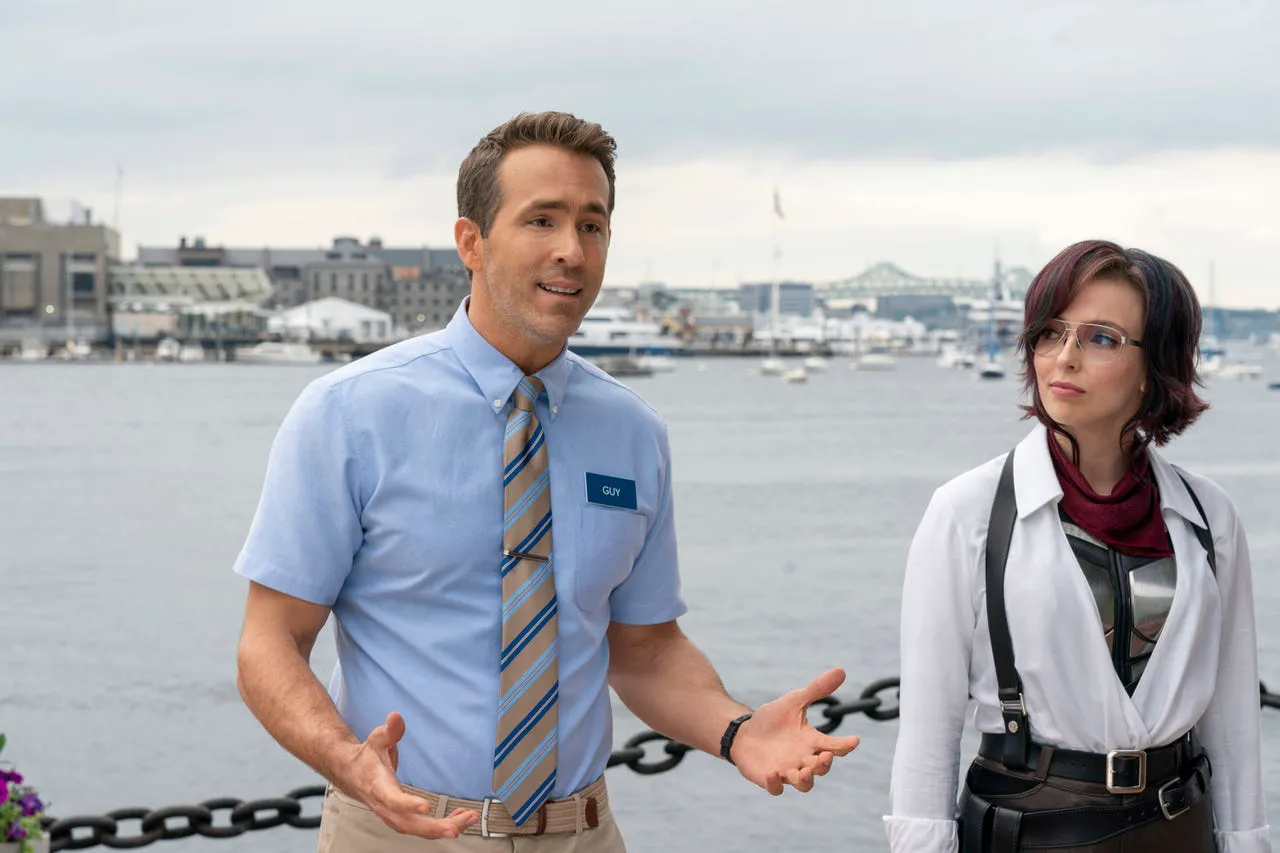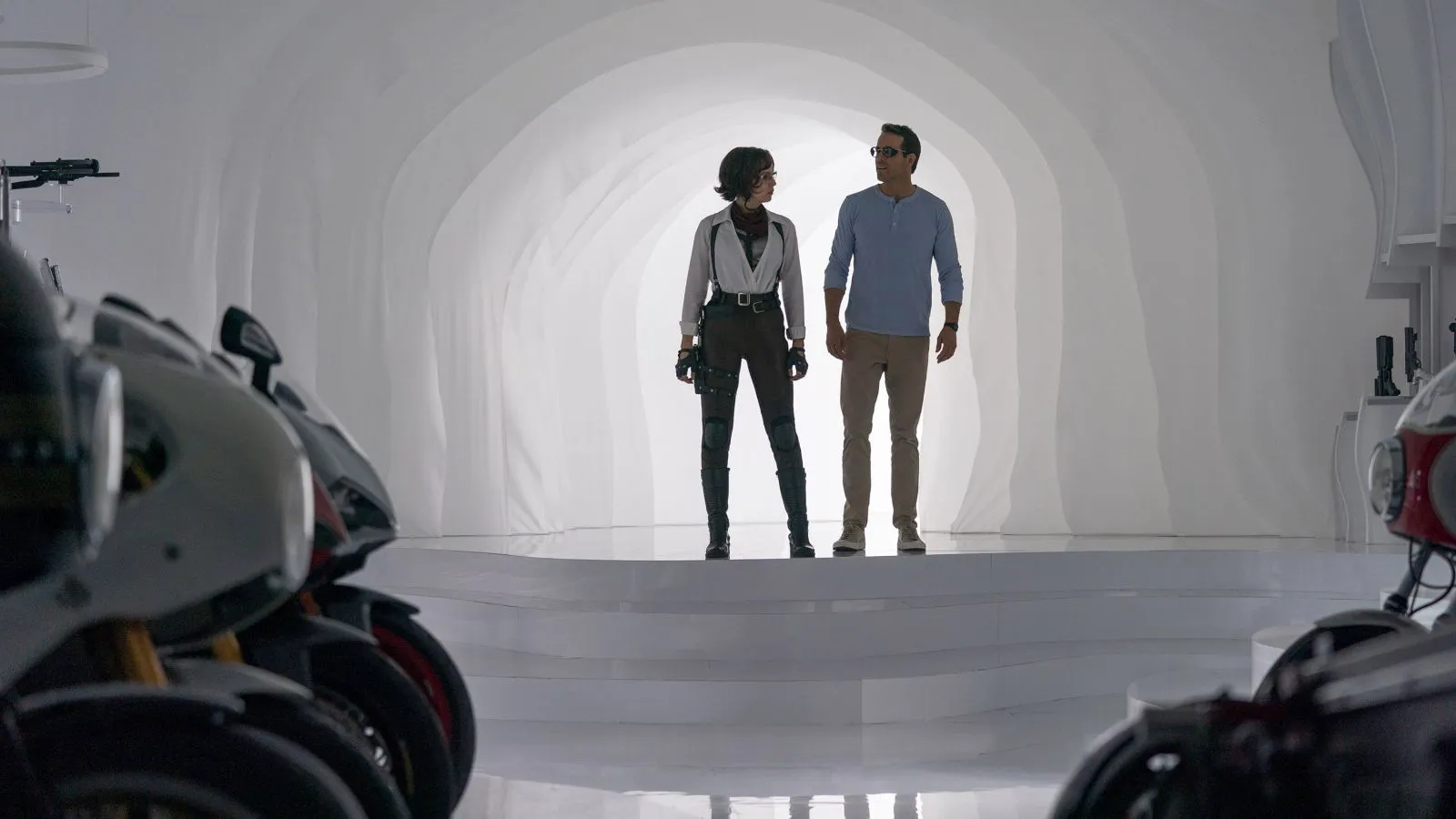Guy: A Blockbuster That Bites the Hand That Feeds It?
A guy named Guy (Ryan Reynolds as Ryan Reynolds) is a simple NPC in the multiplayer action game Free City (a clear nod to GTA V, but with interfaces reminiscent of cheap mobile games). He’s a bank employee who gets robbed dozens of times a day by greedy players. He’s long accustomed to his routine: ordering the same coffee in the morning, exchanging the same stock phrases, and routinely getting kicked in the face by another user. He doesn’t yet know that his world is fake, and he’s happy in his ignorance. That is, until he meets a girl with the nickname Molotov Girl, aka Millie (Jodie Comer), and something clicks in his artificial mind. Guy deviates from his programmed path and begins, just like real players, to gain “levels,” but not through robberies and shootouts, but through good deeds.
Millie, on the other hand, has a different problem. She plays Free City not for the dopamine rush, but to find remnants of the original code within it. The game’s owner, the charismatic villain Antwan (Taika Waititi), once bought Millie and her co-author Case’s (Joe Keery) indie project, hired Case to work for him, and possibly illegally used their work to create his mindless, money-grabbing shooter. If Millie can prove that he actually reworked their game into Free City, she can sue the corporation and reclaim her copyright. There’s just one problem: in a couple of days, Antwan will shut down Free City for a sequel, and the source code will disappear forever – along with the sentient Guy.
 Free Guy"" data-href="" style=""/>
Free Guy"" data-href="" style=""/>
Ryan Reynolds as Guy in a still from “Free Guy”
From a conceptual standpoint, “Free Guy” is the most intriguing action film of the summer (or perhaps the year): a meta-blockbuster that incorporates ideas from other stories about fake worlds and real feelings. From “The Truman Show,” it takes the existential drama of a person realizing the artificiality of their own life; from “Stranger Than Fiction,” the sharp conflict between Hero and Author; and from “The Lego Movie,” all sorts of jokes and postmodern flirtations with pop culture. What’s relatively new here is the strong emphasis on real-world context, that subplot about indie developers forced to fight a predatory corporation for the right to free creativity. Something like this was also present in “The Truman Show” and even “The Lego Movie,” but “Free Guy” is distinguished by its, shall we say, desperate non-metaphorical statement: such a situation, where the successes of a small team are criminally exploited by a soulless big studio, is all too easy to imagine in real life. It’s a blockbuster that mocks the very culture of blockbusters, a simple but all-too-relevant film about how the industry’s eternal pursuit of money deprives art of all that is creative and new. Sounds great, no questions asked. But not when a film with such rhetoric is released by Disney – the very embodiment of all the evil that the characters of “Free Guy” are fighting against.

Ryan Reynolds as Guy in a still from “Free Guy”
In other words, a multi-billion dollar studio that in recent years has hardly made any big films outside of well-known franchises or remakes of animated classics is teaching us that free creativity, it turns out, must be protected. And creating safe sequels to projects that once took off and absorbing small creative teams for profit is very, very bad. The latter is especially ironic, considering that “Free Guy” is actually a 20th Century Fox film that ended up at Disney after they bought out the competition (“Fox,” of course, was far from a small team, but the parallel remains).
A Missed Opportunity for Self-Reflection?
One could even see some special form of self-irony here, if “Free Guy” weren’t so bland. Don’t get me wrong, it’s a perfectly competent summer blockbuster – sometimes funny, sometimes exciting, it will definitely find its audience and is unlikely to strongly anger anyone. But for a film that wholeheartedly advocates for creative freedom and a departure from industry conventions, it’s too conventional. Again, all the important dramatic twists and turns, such as the hero’s internal changes or shifts in his motivation, are explained aloud in dialogues (and this is in an action film, which should be about action), again we are offered a sanitized studio tentpole without any hint of original vision: there is neither the expressiveness of “Ready Player One” nor the charming silliness of “Spy Kids 3D.” It’s funny, considering the theme of “Free Guy” and its loud declarations on the importance of Authorship, that the film itself was directed by Shawn Levy – a director who is not bad at all, but maximally devoid of any recognizable style. A person whose films look as if they were made by a collective mind or a talented neural network.

Ryan Reynolds as Guy in a still from “Free Guy”
Superficial Exploration of Gaming Culture
In other words, the complete opposite of an “Author,” an ideal studio scripter who, apparently, also knows nothing about video games except for the faces of famous streamers like Ninja and dances from Fortnite (and he was once slated to direct “Uncharted,” what a relief). Therefore, “Free Guy” doesn’t work too interestingly with its setting, trying to quickly move from the particular (that is, irony over gaming conventions) to truisms on the theme of love, friendship, and self-realization. Remember “Stranger Than Fiction” – there, the hero, realizing he was a character in a novel, dealt with his situation together with a literature professor, and at one point faced a dilemma: to die for a superbly beautiful ending or to continue to lead a gray existence? In “Nirvana” from 1997, the protagonist of the game, after gaining consciousness, asked his creator to destroy him, tired of constant deaths and rebirths. In “Free Guy,” the unique specificity of video games as an art form is understood very superficially – yes, people shoot without any reflection at those killed, everything is loud and bright, and all gamers actually live with their mothers and are generally terrible racists, sexists, and homophobes. Almost the only interesting find in this vein is the character of Dude, who is released into the virtual world with unfinished scripts, and therefore, instead of a catchphrase, literally says “Catchphrase.”
A Paradoxical Blockbuster
“Free Guy” is generally a film of great contradictions or, alternatively, even greater Hollywood hypocrisy. A loud and non-stop blockbuster that criticizes Free City and contrasts it with the “real” art of Case and Millie’s quiet game, where you just had to sit, do nothing, and watch the lives of NPCs (the film itself, however, is not very interested in doing this for some reason). The main character here is a person who radically stepped out of his comfort zone; but he is played by Ryan Reynolds for some reason – an actor who has not left this very comfort zone for several years, and this is with his dramatic potential. The film criticizes the mindless exploitation of old, borrowed ideas – and itself gives the character Captain America’s shield and a lightsaber for a couple of seconds of fan service. All this works only if you imagine “Free Guy” as a brazen act of in-studio sabotage, a post-ironic faceless blockbuster about the harm of faceless blockbusters, which shows by its own example why the industry so desperately needs new ideas and people.